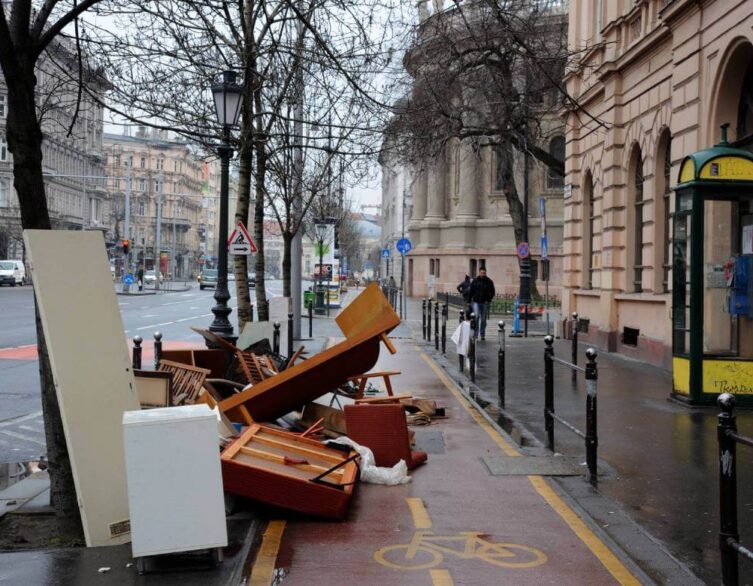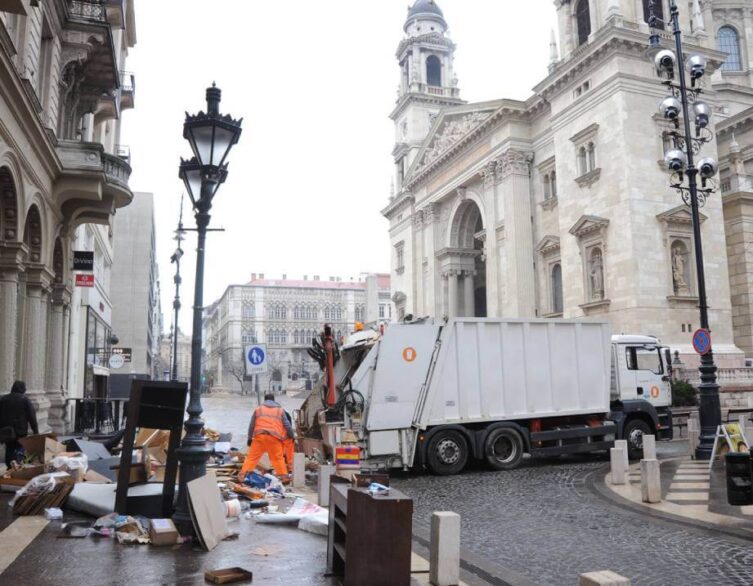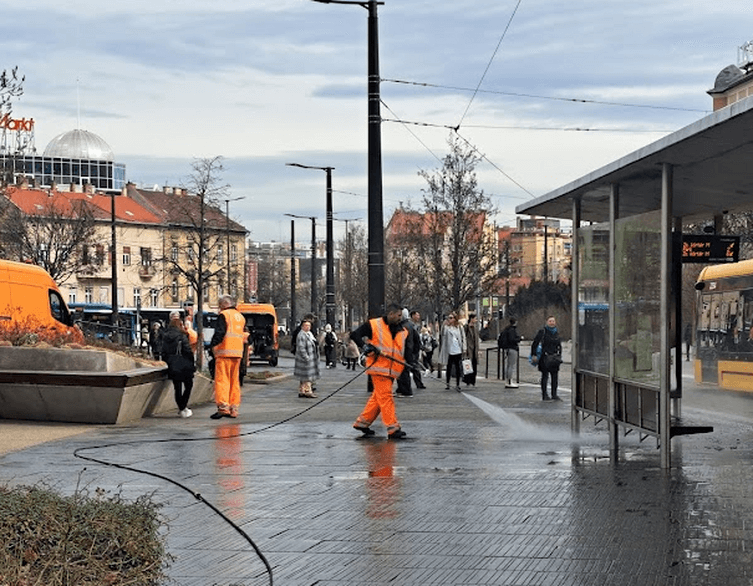Budapest’s Annual Curbside Garbage Disposal Collection: A Treasure Trove for the Needy

Every year, the residents of Budapest eagerly await the annual curbside garbage disposal collection, organized by the Budapest Public Waste Management Company (FKF). This event allows households to dispose of large, unwanted, or broken items that are no longer suitable for use, free of charge. The collection dates are determined by the FKF in coordination with the district municipalities, taking public holidays into account. The city is divided into zones, and the waste is collected from each zone on a specific day to quickly clear any potential obstacles from public areas.
This Friday and Saturday many of the streets of downtown Budapest will be temporarily filled with huge piles of curbside “treasures” making it an unpleasant, if somewhat funky, scene.
The Collection Process
The FKF divides the districts into zones, allowing for concentrated and efficient collection of the discarded items within a single day, quickly removing any potential obstacles from public areas. The waste is collected exclusively on the day following the designated placement date from in front of the properties.

Image source: Budapest Public Waste Management Company
Residents are informed in advance about the exact date and method of placing the waste through written notifications from the FKF. Following the collection, the FKF is responsible for cleaning the roadway, while the owners, operators, or users of the properties are obliged to clean the area in front of their premises and the sidewalk.
What Can Be Disposed Of?
During the annual collection, residents can place large household waste items that have become unnecessary, such as worn-out furniture, mattresses, and carpets, in front of their houses. It is crucial to place the waste in a location that is easily accessible by the FKF’s waste collection vehicles, without obstructing pedestrian or vehicle traffic. Waste should not be placed on roads, bicycle paths, or green areas.
Waste Reuse Initiatives in Budapest
Budapest’s waste management company, FKF, is committed to promoting waste reuse whenever possible. In addition to their regular waste collection and disposal services, they have implemented several initiatives to encourage residents and visitors to repurpose and reuse items that are no longer needed but still functional.
Waste Reuse Centers
FKF operates two Waste Reuse Centers in Budapest, where residents can drop off usable items they no longer need, free of charge. These centers accept a wide range of items, including baby equipment, toys, sports equipment, furniture, books, kitchen utensils, and home decor items, as long as they are in good condition and can still serve their original purpose.
Visitors to Budapest can also benefit from these Waste Reuse Centers. They offer a unique opportunity to find interesting and affordable items while supporting a sustainable and eco-friendly initiative. After paying a small storage fee (ranging from 100 to 10,000 HUF, or approximately 0.30 to 30 EUR, depending on the item’s size), anyone can take away the items dropped off at the centers.
By visiting these centers, tourists can discover unique souvenirs or practical items for their stay in Budapest while contributing to waste reduction and the promotion of reuse. The Waste Reuse Centers aim to raise awareness about the value of used but still functional items and encourage a more environmentally conscious lifestyle.
Best deals of Budapest
Educational Workshops and Classes
In addition to providing a space for item reuse, the Waste Reuse Centers also serve as educational hubs. They offer interactive workshops and classes on various topics related to waste management, such as selective waste collection, composting, and the tasks carried out by FKF.
These educational initiatives help raise awareness about the importance of waste reduction, reuse, and proper disposal among residents and visitors alike. By engaging the public in these activities, FKF aims to foster a more sustainable and environmentally conscious community in Budapest.
The Phenomenon of “Lomisok”
Despite the fact that it is illegal to “collect” from the piles of discarded items, several people engage in this activity. Some do it for fun and the thrill, but most are motivated by the prospect of a little extra profit. These individuals are referred to as “lomisok” (scrap collectors) by locals, and some even travel from poorer parts of the country to the more affluent neighborhoods of Budapest to collect the best pieces that will bring them the most money.
Many of the “lomisok” are in financially strained situations, and they fiercely protect their findings. Although they could face fines for collecting the waste, as it belongs to the city waste disposal company from the time it is placed on the curb, they continue to do so, embodying the saying, “One man’s waste is another man’s treasure.”
In addition to the social and economic benefits, the manual sorting of waste during the annual curbside collection contributes to the recovery and recycling of thousands of tons of waste each year. By repurposing furniture and decorations that would otherwise end up in landfills, these people are inadvertently promoting a more sustainable approach to interior design.
The Scale of the “Lomisok” Phenomenon
During each annual collection in Budapest, approximately 700 predominantly Roma-background entrepreneurs with vehicles and their close-knit teams of family and acquaintances, estimated to be around 3,000 to 5,000 people in total, engage in the collection of discarded items. When considering the families of those who benefit from the sale of these items, researchers estimate that each annual collection provides supplementary income for 18,000 to 35,000 socially disadvantaged individuals.
Police Presence
To maintain order and prevent potential conflicts over valuable items, police officers inspect the locations with the largest piles of disposed “goods.” They intervene if a brawl over something valuable escalates, ensuring the safety of all involved parties.
From Rags To Riches
Budapest’s famous ruin pubs are known for their unique, eclectic interiors that create a distinctive atmosphere. While many assume that the décor is carefully curated, a significant portion of the furniture and decorations are actually sourced from the city’s annual curbside garbage disposal collection. During these annual curbside collections, the ruin pubs of Budapest seize the opportunity to acquire unique furniture and decorations for their interiors. Pub owners and employees scour the streets, searching for discarded items that can be repurposed and incorporated into their eclectic décor that give each ruin bar their very specific mood.
Conclusion
Budapest’s annual curbside garbage disposal collection serves as a unique opportunity for households to dispose of unwanted items, while inadvertently providing a means of subsistence for thousands of socially disadvantaged individuals. Despite the illegality of collecting from the piles of waste, the “lomisok” continue to engage in this practice, highlighting the stark economic disparities within the city. While the collection process aims to keep the streets clean and orderly, it also sheds light on the complex social and economic dynamics at play in Budapest.
Related news













